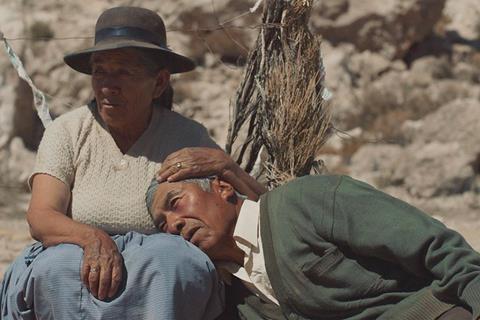Visually arresting love story from Bolivia

Dir/scr: Alejandro Loayza Grisi. Bolivia/Uruguay/France. 2022. 87 mins
On the parched expanses of the Bolivian Altiplano, Virginio and Sisa, an elderly Quechua couple, eke out a basic existence as llama farmers, their daily routine governed by rhythms which were etched into the traditional lifestyle by the many generations which came before them. But the world has changed. And an extended drought has made an already challenging subsistence into a precarious struggle for survival. When the couple’s grandson comes to visit from the city, the question of the future is brought into sharp focus: stay on the land and face an increasingly arduous grind just to stay alive, or flee to the city and risk losing touch with the Quechua traditions and culture. This is by no means the first film to explore the plight of communities which find themselves on the frontline of climate change and it does rather lose momentum in the third act. But through the love story at the heart of this visually arresting feature debut, Utama offers the audience a relatable connection with a way of life which is on the verge of extinction.
A strikingly beautiful work
Bolivian-born writer and director Alejandro Loayza Grisi started out in still photography, before transitioning into documentary cinematography, frequently working on projects with environmental themes. This background experience provides both an aesthetic and thematic foundation for his first feature film, a strikingly beautiful work which employs stunning widescreen cinematography from Bárbara Alvarez (The Headless Woman) to capture the breathtaking highland vistas and the vast, brutal indifference of the landscape. While the film’s sparse storytelling might struggle to break through in the wider arthouse theatrical market, it’s a picture which should make waves in niche play and on the festival circuit after it won the World Cinema Dramatic Competition at Sundance.
The risk with any film which takes as its subject the photogenic simplicity of peasant lifestyles is that it slips into ethnographic romanticisation. Utama avoids this by bringing to the foreground a harshness and desperation which balances the calendar-photo appeal of the limpid-eyed llamas. This is evident throughout but particularly in the sound and the score. The laboured breathing and the dry hacking cough of Virginio (Jose Calcina) punctuates the stillness of the wide, sunbaked high plains. The score, meanwhile, takes the components of traditional Bolivian folk music – pan flutes, percussion, lute – but deconstructs and disrupts them. It’s disconcertingly effective – like elements of the life that Virginio and Sisa share, the music seems both familiar but also alien and unpredictable.
The casting of Jose Calcina and Luisa Quispe (non-professional actors who are married in real life) adds a layer of authenticity, although both seem more at ease with scenes of companionable silence than extensive dialogue.
The arrival of the couple’s grandson, Clever (Santos Choque), reveals that battle lines run through the generations of this family. The grandfather speaks no Spanish, his grandson knows only a few words in Quechua. “Brat,” growled dismissively by the old man, is one of them. But the breakdown in communication goes beyond language. Clever can’t comprehend why his grandparents would reject the easier life in the city they have never known; nor can he understand that his way of living is in some way responsible for the erosion of theirs.
Production company: Alma Films, La Mayor Cine
International Sales: Alphaviolet virginie@alphaviolet.com
Producers: Santiago Loayza Grisi, Federico Moreira, Marcos Loayza, Jean-Baptiste Bailly-Maitre
Editing: Fernando Epstein
Cinematography: Bárbara Alvarez
Art director: Valeria Wilde
Music: Cergio Prudencio
Main cast: Jose Calcina, Luisa Quispe, Santos Choque
























